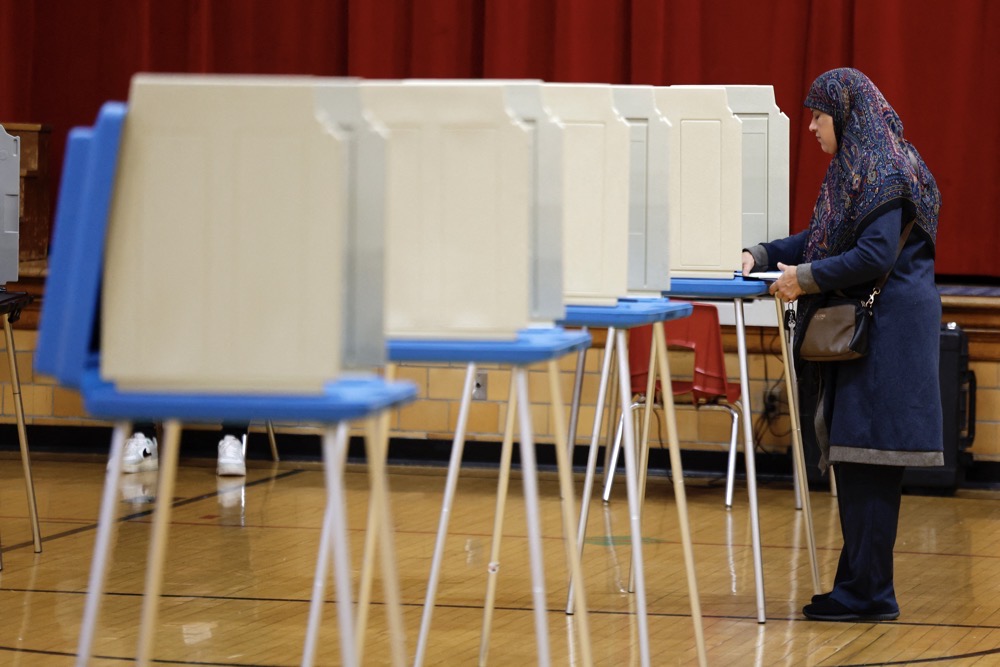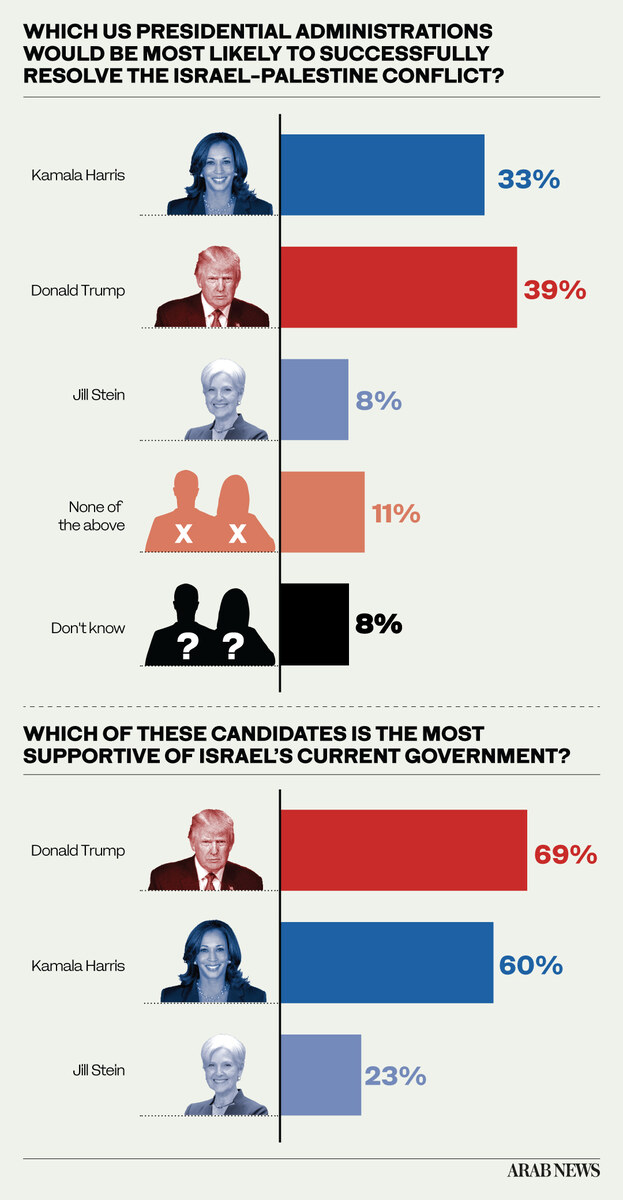LONDON: They are in a minority of about 1 percent.
In the US census carried out in 2020 — the first that specifically sought information about MENA origins — just 3.5 million of America’s 334 million citizens reported being of Middle East and North African descent.
But as Americans go to the polls today to select their next president, that 1 percent is poised to have a 100 percent impact on one of the most important US elections for a generation.
No one would suggest that this is a homogeneous group. Culturally, historically and linguistically, being “Arab” is an umbrella term for peoples as diverse as the 22 nations that comprise the League of Arab States.
But as an exclusive Arab News/YouGov survey revealed last month, in the run-up to the 2024 US presidential election all Arab Americans have been united — in grief and outrage and in disappointment at the performance of the current US administration over the shocking events that have taken place in Gaza and Lebanon over the past year.
The survey also found that Arab Americans were preparing to vote in unprecedented numbers — underscoring just how important their swing-state vote will have been today for Kamala Harris and Donald Trump.
What the survey also revealed, however, is that Arab Americans have been divided over which of the two main candidates to vote for.
This explains the last-minute efforts to woo the Arab American vote by both Harris and former President Donald Trump.

The Arab News/YouGov survey revealed the extent to which traditional Arab American support for the Democratic Party has ebbed away over the Palestine issue. (AFP)
Right up to the wire, the election race has been too close to call, which is why in the crucial swing states that happen to be home to the largest concentrations of Arab Americans, their votes have become like gold dust.
On Sunday Harris was in Detroit, announcing: “I am honored to have the support of many Arab American leaders who represent the interests and the concerns of the Arab American community.”
She also made sure to repeat a line she has delivered frequently during the campaign as she sought to distance herself from association with the perception that the Biden administration had failed to hold Israel in check over the past year.
“The level of deaths of innocent Palestinians is unconscionable,” she said.
The Arab News/YouGov survey revealed the extent to which traditional Arab American support for the Democratic Party has ebbed away over the Palestine issue.
In October, Harris met community leaders in Flint, Michigan, in a clear attempt to make the point that, although she served as his vice president, she is not Biden.
But some community leaders declined the invitation to meet Harris, and not everyone who took part in a virtual meeting with Harris’ national security adviser, Phil Gordon, was reassured by the overture.
Ali Dagher, a Lebanese-American community leader who did not attend the meeting, described Harris’ outreach to the Arab community as “too little, too late.”

Both campaigns have been very aware that of all seven battleground states, the result in Michigan appears to have been the most finely balanced, and on Friday it was Trump’s turn to assure the 200,000 Arab American voters in the state there that he was on their side.
In messages found on billboards along Michigan’s highways, Trump portrayed himself as pro-peace in the Middle East, while casting Harris as pro-Israel. Skeptics saw it as a curious flight of fancy for a man whose record as president was entirely pro-Israel, and not all of them were falling for it.
“We’re not naive about what he means for our community,” Rexhinaldo Nazarko, executive director of Michigan advocacy group the American Muslim Engagement and Empowerment Network, told the BBC.
Opinion
This section contains relevant reference points, placed in (Opinion field)
Nazarko and doubtless many other Arab Americans have not forgotten Trump’s 2017 “Muslim ban,” his recognition of Jerusalem as the capital of Israel and his Abraham Accords, widely perceived in the Arab world as favoring Israel and patronizing Palestinians.
Regardless, several influential Arab Americans have declared for Trump, including Amer Ghalib, the mayor of Hamtramck, near Detroit. He has said his decision to endorse the former president was “a combination of both disappointment and hope” — disappointment with Biden’s handling of the Middle East situation and “hope that some change will bring peace to the Middle East, and we found President Trump is so determined about that.”

Demonstrators protest in support of the Palestinians who have died in Gaza outside of the Arab American National Museum in Dearborn, Michigan. (AFP)
However, one of the latest polls of American voters suggests that Harris is beginning to pull ahead of Trump in five of the crucial seven swing states.
But it is in the three remaining swing states where the election is likely to be won and lost — including in Michigan, where the two candidates are neck-and-neck with exactly 47 percent of the vote each.
This echoes almost precisely the result of the Arab News/YouGov poll, which was published last week, and which also found that the Arab American vote is virtually polarized. Asked which candidate they were most likely to vote for, 45 percent said Trump, while 43 percent opted for Harris.
This was a big surprise, especially as 40 percent of those polled described themselves as natural Democrats, only 28 percent as Republicans and 23 percent as independents.
The poll made clear just how many Arab Americans appear to have switched their allegiance from the Democrats to the Republicans in response to the disappointment engendered by the Biden administration’s handling of Israel and the catastrophe in Gaza.

It will soon be clear whether Harris has been able to shake off that association among Arab American voters.
Whether she has or not, and whoever will be heading for the White House in January following today’s vote, the 2024 presidential election is already a historic one for Arab Americans. Their wholehearted embrace of the US democratic process — on a scale far outweighing that of the American electorate overall — has been on an unprecedented scale, reflecting not only their concern for their familial homelands but also their engagement with the politics of America.
Because make no mistake: Although the world categorizes them as Arab Americans, they see themselves as American Arabs — and their stake in the country that can lay claim to being the world’s greatest melting pot of immigrants is as deeply embedded as any.
In 2023 Dearborn, Michigan, became the first Arab-majority city in America. The fact that it did, and that Michigan’s Arabs have been in a position to play such a vital role in the selection of America’s next president, is down to something as all-American as the Model T Ford — literally.
At the start of the 20th century there was nothing much other than farmland in and around Dearborn. In 1908 Henry Ford began producing his revolutionary Model T cars in Detroit, and among the first workers he hired on the production line were Arabs who had recently emigrated from Syria.

Joe Biden stepped aside in July to allow his VP, Kamala Harris, to contest the election. (AFP)
They were followed by others, chiefly from Palestine, Lebanon, Iraq and Yemen, who all settled in and around Dearborn, working for the gigantic Ford factory that grew up there, and where the company still has its headquarters today.
There have been 21 presidents since the first Arab immigrants began working on Ford’s Model T production lines in Michigan 116 years ago. When the last polls close in Michigan today at 9 p.m. Eastern Time, their descendants will have the satisfaction of knowing that in the race to become the 47th president of the United States they have been firmly in the driver’s seat.































